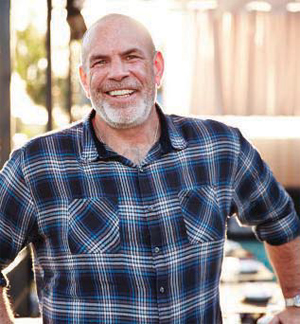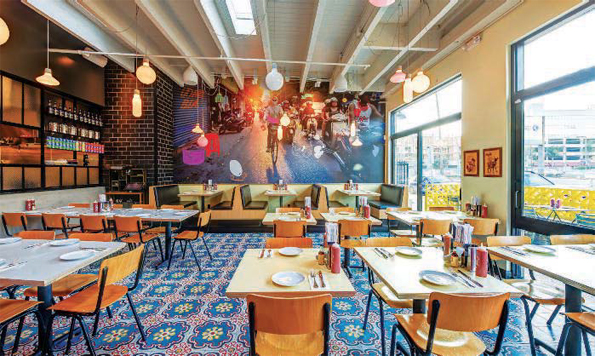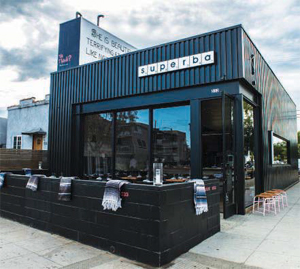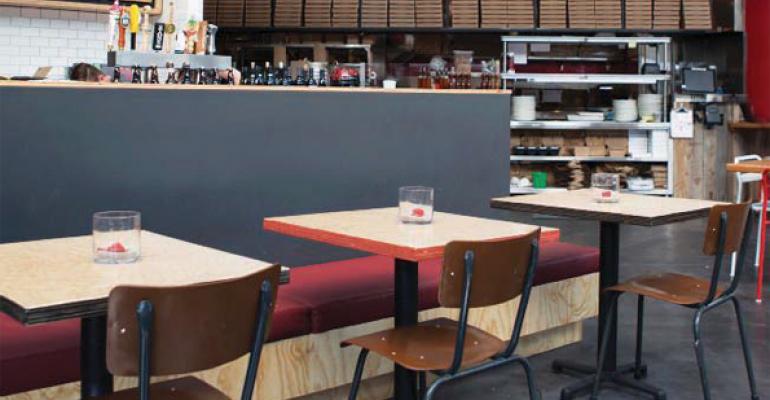
Paul Hibler is an integral part of three up-and-coming brands: Pitfire Artisan Pizza, the farm-to-table Superba brand, which encompasses a small plates bistro and an all-day bakery; and the latest, East Borough, a California-Vietnamese hybrid that resulted from a collaboration with two Orange County, CA, chef-owners, which opened a second unit in Culver City, CA, earlier this year.
Hibler first got rolling with Pitfire, his idea of an “anti-chain.” Menus at his concepts reflect the locale and highlight local and premium ingredients. He hires local architects to ensure each location captures the neighborhood ethos. And he founded American Gonzo Food Corp., a restaurant incubator, so he could support young, raw culinary talent looking for someone to help them achieve their dreams. He is leveraging that talent and his business infrastructure to expand.
RH: Let’s see: pizza, small plates/bakery, Cali-Vietnamese. What are the common elements here?
Hibler: All my restaurants share the same fundamental operating principles: simple, great design, and affordable food—clean food that works well with California products.
RH: Do you strive to create sustainable menus?
Hibler: That’s kind of a given. We don’t even mention it. What we really sell is unprocessed, healthy food in a warm, engaging environment that’s not at the top of the price spectrum.
RH: You call your restaurants “artisan.” How do you define that?
Hibler: Artisan means handmade. At Pitfire, for example, hand tossing is a skill. Tending the fire in the wood oven is a skill.

RH: What kind of check averages do you see?
Hibler: At Superba Snack Bar, the most high-end restaurant, checks run about $52 for dinner and $32 for lunch. And that’s mainly because we do a lot of wine sales there. Because everything is curated toward good value, we have to be clever. So we sell a lot of European wine because it’s more of a value.
RH: What’s in your portfolio now, and where do you see it going?
Hibler: We will have two Superba locations, seven Pitfire Pizzas and two East Boroughs. We are about to open two more Pitfires.
People are always asking when we are going to open more Superbas. But I’m still trying to find out how far out you can grow and still be considered an artisan restaurant. Two years ago I had four restaurants, now I have 10.
RH: Is there a substantial difference between 4 and 10?
Hibler: Four are very wonderful and easy to manage. I’m a passionate, emotional leader. The bigger I’ve gotten, the more I’ve had to become level-headed. People who run bigger businesses tell me “go get a prescription for beta blockers, because you’ll need them to chill out.”
For me, the hard part is finding managers—the people who show up every day. That’s the key.
Retaining talent

(Continued from page 1)
RH: How do you find and keep them?
Hibler: We have created a culture at Pitfire. We want our people to exceed the guests’ expectations—and for them to do that, we have to inspire them first. We do that by building a sustainable culture.
A lot of people who interview with me have bounced around. Companies don’t try to develop their people. I’m more into long-term relationships.
RH: Since you are growing, it would seem potential for career advancement is one incentive. What other ways do you take care of your people?
Hibler: We get into a relationship with them, and we treat them like valuable treasures. We spend a lot of time mentoring them. We throw a lot of stars up in the sky for them to shoot at.
I’m not a micromanager. I will give people some basic ground rules—ethics, honesty, accountability—and give them some latitude.
As a result of that, and the design, each of my restaurants does not look like the next one. I find that inspires people to hang around and stay with the company.
RH: Where do you see opportunities for growth?
Hibler: We’ll probably build another Superba concept in line with the snack bar theme. We’re also looking at an old school Italian deli idea. And we’re expanding into Northern California. We can’t go to San Francisco and open one unit; we need to be prepared to do three or four, and we’re getting there.
RH: You’ve set up an infrastructure to help smaller chef-entrepreneurs get concepts off the ground. What kind of support system do you have?
Hibler: I spent the last three and a half years trying to grow and invest out in front of our expansion. We now have 12 people on the corporate staff.
RH: You have a lot going on right now. What kind of work schedule do you keep?
Hibler: I spend most of my time in my car. I have restaurants from Newport Beach to West Hollywood—it’s a lot of territory to cover. I just follow my phone all day—it tells me where to go.





